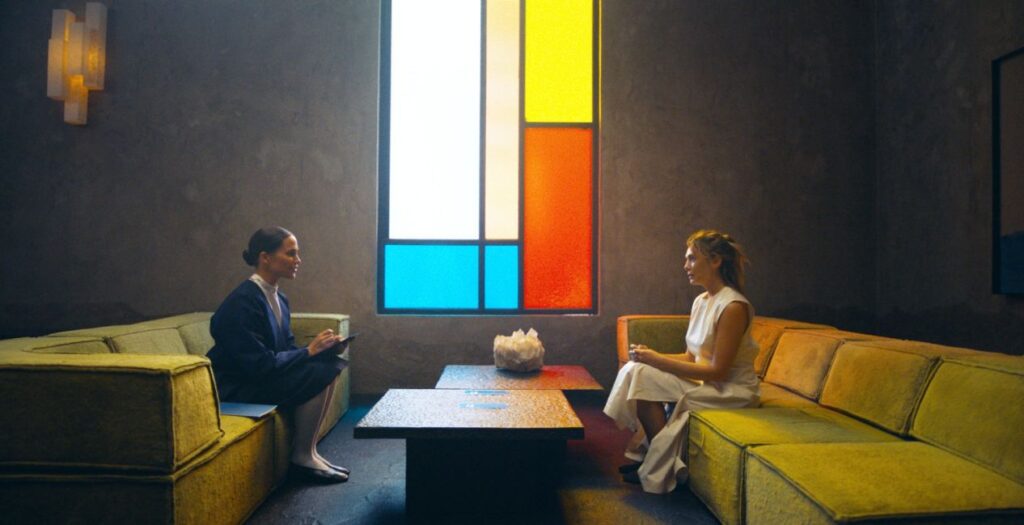The Assessment is equally chaotic and devastating, capturing the nuanced complexities of parenthood with topical questions that many have found themselves asking on their own journey. Who is worthy of becoming a parent? People have a multitude of opinions as to who shouldn’t and should have kids, often based on arbitrary measures that no one can live up to, including some of the best parents. Now, give the power to decide who can and cannot have children in a world in crisis, and you have the premise of Fleur Fortuné’s The Assessment.
Set in a dystopian future, climate change has made resources scarce—so much so that the government has forced sterilization through a regiment of drugs onto its populace to control its numbers. If couples want a child, they must apply first for analysis. If they pass the initial application round, they qualify for the titular assessment. That is where we find botanical scientist Mia (Elizabeth Olsen) and her husband and geneticist Aaryan (Himesh Patel). On paper, the two would be considered by many to be the ideal parents. This should be a cakewalk for them.
Once the assessor, Virginia (Alicia Vikander), arrives, the power imbalance between the government representative and the couple is instantaneous. Failure is not an option. If the two fail the test, they are forbidden to try to apply again. This is their one chance at a child. The stakes are high and incredibly clear to the viewer. Given one shot at conceiving, it opens the doors of psychological exploration and boundary-pushing—something that Vikander’s Virginia takes full advantage of—for better and worse.
The world of The Assessment and its backstory are thoroughly realized. The simple, sterile design of Mia and Aaryan’s home is striking. Pops of color are rare, symbolic of the lack of life on the planet. Dialogue fills in the gaps, with Mia and Aaryan’s line of work standing out in significance. The reminder of the “old world” lies in spoken words, with the threat of the past always lurking around the corner. This fear guides every action, but natural desires still arise. Past desires can’t run away forever. No matter how heavily regulated.
Mia prefers the comfort of nature, cultivating the plants that are, in their way, her children. She is the nurturer, even if she bristles easily. In contrast, Aaryan prefers the comfort of his lab, obsessing over his work and finalizing every detail. Despite this, he craves a family of his own. This stark difference between the two becomes all the more deep as time passes, with each falling into their prospective genderized roles and the stereotypes that come with those roles.
Virginia puts Mia and Aaryan through the wringer, finding the couple’s sore spots and tearing them open for the whole world to see. Each new discovery unveils a layer to Patel’s and Olsen’s performance and shifts the relationship. It’s not always a drastic change, but the energy between them shifts and changes; it is electric. With each new violation, the heart breaks. The performances, along with John Donnelly’s, Nell Garfath Cox’s, and Dave Thomas’s screenplay, make this so.
Patel and Olsen ground the scenes while Vikander lives an actor’s dream. The Assessment features Vikander at her most depraved, even as she fully leans into a childlike persona. If people had considered having children before, Vikander’s performance would likely have inspired people to forego the effort. The line between reality and simulation blurs, leaving the couple and the audience questioning the assessor’s real intentions. It is a testament to the writing, direction, and Vikander that we’re steps behind.
This is why the final twenty minutes of The Assessment are a slight letdown. Rather than let the mystery surrounding Virginia and the titular assessment linger in the air, the decision was made to reveal all the cards. The needless exposition undercuts the mystery and depth of emotional impact and adds little that would surprise surrounding the world our character lives in.
With the mystery stripped away, the final fates of our characters resonate weaker than they should. But it’s not any less striking. No one is spared the rawness of the assessment and its aftermath, with each character’s decision aligning with everything the writers and performers left behind. The lingering shot on Olsen’s face before the credits roll solidifies this.
The Assessment will provoke lots of thought. As someone who has made hard reproductive decisions, I found myself thinking a lot about the government’s impact and influence on birth and the pressure placed on prospective parents long before they conceive. Going to such an introspective place made it clear the full breadth of impact that Fortuné‘s personal experiences with conceiving had in how layered and complex The Assessment became.
The ending may rankle viewers, but The Assessment is almost perfect. Despite its dystopian future and the agonizing nature of the test, this film hits at core anxieties and painful truths. The pressure to conceive, succeed, and sacrifice are the realities of becoming a parent. But there is no such thing as perfection, and that harsh reality and what that means makes The Assessment so devastating.
The Assessment played as a part of the 2024 Toronto International Film Festival.
The Assessment
-
Rating - 8.5/108.5/10
TL:DR
The Assessment is equally chaotic and devastating, capturing the nuanced complexities of parenthood with topical questions that many have found themselves asking on their own journey.







